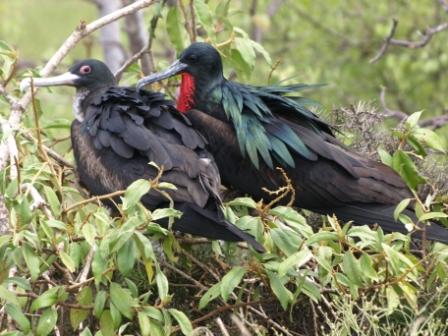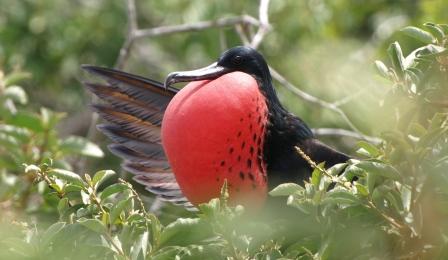The Magnificent Frigate Bird

VulcanSpirit
Richard & Alison Brunstrom
Sat 28 Apr 2012 00:29
|
Darwin's genius was to recognise from readily
observed phenomena the fact that species of plants and animals, previously held
to be immutable, must and do change over time. He realised that the individuals
of all species vary, and that this variety can be used by humans or
nature to effect lasting change. He had three classes of evidence; all
three are still in use scentifically today.
The first was selective breeding, or artificial
selection. Blindingly obvious, in retrospect. Man has selectively bred
domestic animals and plants for millenia - think dogs (all of which are
genetically wolves, although they may have been domesticated more than once),
roses, fancy pigeons or maize and wheat. Humans have selectively bred for
characteristics they found valuable; in doing so we unknowingly (before
Darwin) exploited the natural genetic variation within each species
(remembering that Darwin knew nothing of genetics).
The second is sexual selection. Think for
example of peacocks, or pheasants or birds of paradise. In these cases the
female bird herself choses a mate based upon some characteristic that she finds
attractive. This process (we now know) can start a genetic positive feedback
loop resulting in almost absurd developments. The size of the male peacock's
tail is limited only by the adverse impact that having it confers on his own
survivability. A balance is struck, driven by female (in these cases)
preference. It can have quite astonishing results.
A case in point is the Magnificent Frigate Bird
Fregata magnificens which nests on Galapagos and was known to Darwin.
Here are a couple on the nest on Seymour Norte; the male on the right has
metallic green feathers on his back:
 These are large birds (wingspan of about 1.5metres)
which get much of their food by stealing it from other species of seabird on the
wing. They are fantastic acrobats and swoop right down to the surface of the sea
- but if they go in the drink they're dead, for strangely for a seabird they
cannot take off from water. But notice the red throat of the male. Here he is
displaying:
 That red throat is in fact a huge pouch of skin
which he can inflate at will. Not only is it a visual signal, he can also use it
rather like a frog's vocal sack to magnify his calls. He selects a good perch,
inflates his chest, and spreads his wings to show to the females (who cruise
past overhead) what a superb specimen he is. If he's lucky, one will choose him.
This 'crazy' pouch which has no other utility is as good an example of
sexual selection as a peacock's tail and every bit as beautiful. But no-one had
ever thought of sexual selection, nor of its consequences, before
Darwin.
But his real impact, which was to turn the
scientific and religious world upside down, was his theory of natural
selection.
|